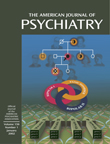Use of Atypical Antipsychotics During Pregnancy and the Risk of Neural Tube Defects in Infants
Abstract
OBJECTIVE: Folate deficiency in early pregnancy and maternal adiposity, independent of folate intake, lead to a greater risk of neural tube defects in infants. Atypical antipsychotics cause various degrees of weight gain. The authors assessed folate status and obesity among patients with schizophrenia receiving atypical antipsychotics. METHOD: A sample of 70 inpatients and outpatients (21 of them women) who were taking antipsychotics was randomly selected. Body weight, body mass index, daily folate intake, and folate serum concentrations were determined. RESULTS: The majority of the patients were overweight. Only eight of 37 patients had folate intake above 400 μg/day, the level shown to be protective against neural tube defects. Mean serum folate was significantly lower than in a general hospital group of 810 patients. CONCLUSIONS: Women with schizophrenia who take atypical antipsychotics have a higher risk of neural tube defects in their infants because of the associated low intake of folate and obesity.



